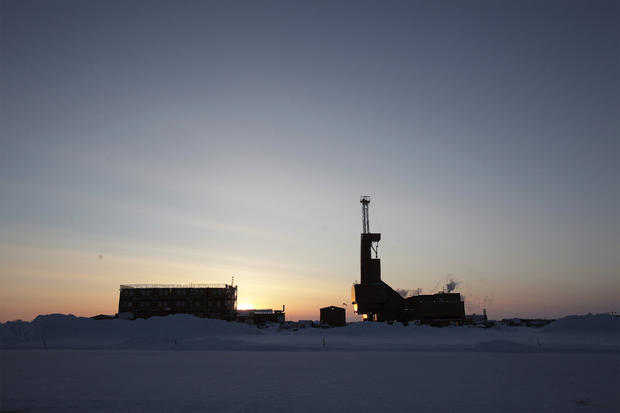The Biden administration has canceled one of the most high-profile oil and gas lease opportunities pending before the Interior Department. The decision, which halts the potential to drill for oil in over 1 million acres in the Cook Inlet in Alaska, comes at a challenging political moment, when gas prices are hitting painful new highs.
In a statement shared first with CBS News, the Department of the Interior cited a “lack of industry interest in leasing in the area” for the decision to “not move forward” with the Cook Inlet lease sale. The department also halted two leases under consideration for the Gulf of Mexico region because of “conflicting court rulings that impacted work on these proposed lease sales.”
The Interior Department’s Bureau of Ocean Energy Management has previously canceled lease sales in Cook Inlet three times — in 2007, 2008, and 2011 — also citing “lack of industry interest” at the time as the reason for scrapping the sales.
Federal law requires the Department of the Interior to stick to a five-year leasing plan for auctioning offshore leases. The administration had until the end of the current five-year plan — set to expire at the end of next month — to complete these lease sales.
Lucas Jackson / REUTERS
Until now, the White House had remained silent about the massive Alaska lease. However, canceling the sale would be in keeping with political promises President Joe Biden made in the name of halting global warming. But those promises have become a political challenge in the face of prices at the pump.
“They don’t want to get hit by the Republicans in light of the high gas prices,” one environmental advocate told CBS News, speaking on the condition he not be named because of the sensitivity of the topic. “They’re getting killed on attacks based on inflation. The most visible sign of inflation is high gas prices.”
The delicate political situation was evident after a top environmental official showed her hand in an email that copied a CBS News reporter. Gina McCarthy, the White House national climate adviser, wrote that “the Cook inlet sale was canceled. It is not proceeding.”
Almost immediately, another White House official jumped in to declare that McCarthy got ahead of herself. Interior Department officials said a final decision had not been made. On Wednesday, though, with time running out, the department made its announcement.
Frank Macchairola, a top official with the American Petroleum Institute, the country’s largest oil and gas trade association, called the cancellation of the Cook Inlet lease “another example of the administration’s lack of commitment to oil and gas development in the US.”
“The President has spoken about the need for additional supplies in the market, but his administration has failed to take action to match that rhetoric,” Macchairola said, adding that politically it would play “not well.”
“In the kind of price environment that we’re seeing, there are negative consequences to shutting off oil and gas development, both politically and practically,” he said.
On Wednesday, the national average price of regular gas hit an all-time high of $4.40, according to AAA.
For environmental groups, the decision was welcome news. The Alaska offshore lease arrangement would have opened drilling opportunities over a span of more than 1 million acres for 40 or more years of production. The new activity would have led to new underwater pipelines and platforms in the environmentally-sensitive area.
Drew Caputo, vice president of litigation for lands, wildlife and oceans for the environmental advocacy group Earthjustice, said more than a decade would pass before those leases could have had an impact on gas prices.
“It’s good for the climate, which can’t handle new oil and gas development,” Caputo said. “It’s good for Cook Inlet because offshore drilling is dangerous and disruptive. And it’s good for the people of Cook Inlet, including native people, who cherish the inlet in its natural state. So it’s a really good thing.”
Still, any decision that worked against the interests of oil and gas involves political trade-offs. According to a recent CBS News poll, Mr. Biden’s approval rating is lowest when it comes to the economy and inflation, with 69% of those surveyed disapproving of his handling of inflation. Sixty-five percent of respondents said they believed the president “could do more” to lower gas prices.
American Petroleum Institute senior vice president Frank Macchiarola said in a statement, “Unfortunately, this is becoming a pattern – the administration talks about the need for more supply and acts to restrict it. As geopolitical volatility and global energy prices continue to rise, we again urge the administration to end the uncertainty and immediately act on a new five-year program for federal offshore leasing.”
But environmentalists argue the climate issue is too important to get caught up in political battles.
“The scientists are telling us the time to shift from fossil fuel energy is not years from now,” Caputo said. “It’s today. We need to end offshore oil leasing.”
